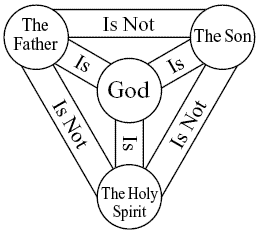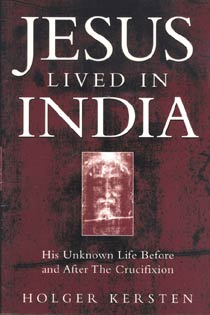
A HINDU'S VIEW OF JESUS CHRIST
Author - Anil Chawla

|
A HINDU'S VIEW OF JESUS CHRIST
|
Probably no other person in the history of mankind inspires as many people as Jesus does. And there is no one else who is so widely talked about and yet about whom so little is known. Gospels talk about only a small portion of the life of Jesus. Gospels were written almost a century after Jesus stopped walking on this earth. Jesus did not write any of the gospels. He or any of his close disciples (apostles) did not even have a glance at the gospels. Of more than 60 gospels that were in circulation at one time, the Church accepted only four and destroyed or hid the rest. Canonical gospels of Matthew, Mark, Luke and John surely present a view of Jesus that was most convenient for the Church, without making any claim about any or all of them being a complete account of the life of Jesus.

Jesus did not set up a Church. There was no hierarchy among the apostles. There seems to be ample evidence to indicate that Jesus was opposed to the organized hierarchical clergy-bound religion that existed in Jerusalem at that time. It seems a fair guess to conclude that the opposition of the priests and ruling classes of Jerusalem to Jesus was because he had challenged the established religious systems and procedures of that time. Although the Church would have us believe that teachings of Jesus should be interpreted in the light of the Old Testament, circumstantial evidence indicates that Jesus was opposed to the Old Testament and never accepted the concept of God as propounded therein.
If one has to reconstruct the rise of Christianity during the early centuries, there is hardly any secular evidence available. It seems that many early Christians, like Jesus, did not indulge in power games and made no attempts to get close to the Kings and powers. But soon, the religion attracted a new bunch of converts who were keen to win favours with the ruling classes and expand their sphere of influence. The first compromise was, probably, recognizing Old Testament as a religious text. This is understandable. The nascent religion did not want to face persecution. Early Christians believed in Jesus but did not wish to go on the cross like He did. So, a compromise formula evolved by which they accepted Old Testament while continuing to sing hymns about Jesus. A similar phenomenon is seen in the tactics of Christian missionaries in modern India. Many Christian missionaries in India have thoroughly studied ancient Indian texts. Some of them have composed hymns in Sanskrit and other Indian languages. They have not gone as far as accepting any of Hindu books as one of the Christian holy books. But, one has to understand that a present day missionary has extensive financial backing and political support, while in the first and second centuries Christians faced extensive persecution. If modern day Christian missionary can take to singing Sanskrit hymns and adopting pagan practices and symbols, it seems most likely that early Christians adopted the Jewish holy book and the Jewish concept of God, even though Jesus would never have countenanced such a move.
Jewish concept of religion and God is rule-bound. Central to the Jewish belief is the existence of a covenant between the God and his chosen people. The covenant is the basis of religion, morality and all laws for Jews. Covenant is what God has ordained and there is no place for human heart to modify this covenant. Any violation of the covenant is duly punished. Instead of rule-bound regime Jesus presented a vision of love. God, as Jesus saw Him, is a loving one, who loves and is loved; who pardons even sins.
Acceptance of Jewish concept of God, even while paying lip service to Jesus, was not final in the Christian world. The concept of God in Christian world kept changing over the centuries. Many Christians, today, see God as a trinity (Father, Son and the Holy Spirit). But this trinity-based-concept of God came into Christianity more than 300 years after Christ. Many Christian sects reject this concept of God. We do not know whether Jesus accepted the trinitarian God. But we do know for sure that he advocated a life based on love for the neighbour and love for God. All miracles that Jesus performed (curing the sick etc.) were manifestations of his love for all those who were suffering. One may say that love was central to teachings, life and philosophy of Jesus. Moving from love and compassion that comes from the heart to the complexity of trinity, was surely a step that took Christianity beyond Jesus.

It is not unlikely that the concept of Christian trinity was developed by Church (with advice from the King of Constantinople) to counter the Hindu concept of Trinity, which was popular in large parts of the world at that time. More about a comparison of Hindu trinity with Christian trinity will need a separate article. Of course, one must mention here that not all Christians accept God as trinity.
If trinity represents an evolution of the Christian God, it is still more interesting to see the evolution of Church as an institution. Jesus never bought any property. Using His name, the Church collected so much property that at one time, it was said to own half the land of Europe. Theoretically speaking, every believer is said to be a brick that makes the walls of Church. Practically speaking, Church, as an institution, furthers the interests of clergy, who are all powerful and the laity is reduced to playing to the clergy's collective whims and fancies.
The concept of an exclusive channel from God running through the body of Jesus to the Church down to the ordinary mortal would have been unacceptable to Jesus. Love is central to the philosophy of Jesus. Love does not need a channel. When Jesus said, "Love God", it was a call to the heart that needs no intermediary. The intermediation of Church and even Jesus in the relationship between God and humans runs counter to the nature of love.
Jesus probably saw himself in the mould of a guru who guides and holds the hand through a journey. Each one has to do one's own walking on this path of love. Jesus only shows the way. Contrast this with the licenses to heaven that were sold by Church during the medieval ages. Church made it easy for everyone, including sinners, (every human being is a sinner, so does it really matter) to reach heaven. One could pay a certain sum and walk through the gates of heaven holding one's head high. If one accepted the supremacy of Church and contributed time and money for church, one did not need to suffer on the path of love. In this way, Church became the sole franchisee selling benefits of Jesus's suffering to all those who did not want to walk on the path of love themselves. The argument, couched in theological terms, runs that love involves suffering and Jesus suffered for the humanity; any one could benefit from the suffering of Jesus by paying up to the Church.

One wonders how Jesus would react to the distortion of His noble message of love. Notwithstanding the convoluted theological arguments that Church has been perfecting over centuries for furthering its insatiable greed for power and money, Church and organized clergy represent all that is anathema to Jesus.
When I read about Jesus and think about him, I relate to his message of love. Uncovering Jesus from centuries of vested interests and political expediency of Churches and Kings is not easy. But it is not difficult either. All that one has to do is to think from one's heart and live a life based on selfless love.
For me the message of love that Jesus spread is more important than the life and body of Jesus. I am not as concerned about the personal life of Jesus. Whether Jesus had a wife or did not have one? Did he die on the cross? Did he rise up from the dead or was he saved by some medicines? These questions do not interest me beyond a normal curiosity that one is bound to have. Answers to these questions do not in any way affect my belief in Jesus as a divine person whose message of love and compassion can be a savior for the world.

I am inclined to believe Holger Kersten, Nicolai Notovich, Prof. Fida Hassnain, Hazrat Mirza Ghulam Ahmad Qadiani and many others who argue that Jesus lived in India during his youth and also after he escaped death in Jerusalem. However, the connection of Jesus with India is not as important to me as is the fact that I find Jesus talking of the same love and compassion that Gautam Buddha talked about.
I find it quite ridiculous to believe that all human beings are born sinners and are saved from their sins by Jesus going on the cross as atonement for their sins. I find no justification for this belief even in the life and sayings of Jesus. Philosophically speaking, this is in direct contrast to the message of universal love that Jesus espoused.
For modern-day Christianity, God is the creator, but He is not His creation. This dualism of the creator and the creation can be sourced to Old Testament. There is no justification for this dualism in the life and sayings of Jesus. In fact, the message of love spread by Jesus seems to be more consistent with a monistic conception where one sees no duality between the creator and the creation. When one sees no dualism between God and the world, the two commandments of "Love God" and "Love Thy Neighbour" become one. The love of Jesus for God found manifestation through his love for the poor and suffering, and vice versa. As I bow to Jesus, I devote myself to this love for God and the world, without accepting any boundaries between the two.

Was Jesus a Hindu or was he a Buddhist? Let us avoid these labels. Jesus was surely a divine person who belonged to the whole world and the whole human race. Let us listen to his message of love and adopt it in our lives without getting involved in such debates that would lead us nowhere. Let us always remember Jesus as a Son of God who brought to us the message of love.
Time has come to liberate Jesus from churches, theologians and clergy. Let us spread His message of selfless love. Modern world needs peace that can come only from love and not from wars. Today's world needs Jesus more than ever before.
ANIL CHAWLA
31 December 2006
Please write to me your comments about the above article.
 samarthbharatparty@gmail.com
samarthbharatparty@gmail.com

ANIL CHAWLA is an engineer (and now a lawyer too) by qualification but a philosopher by vocation and a management consultant by profession.

Website developed and managed by

MF-104, Ajay Towers, E5/1 (Commercial),
Arera Colony,
Bhopal - 462016 INDIA

© All Rights Free